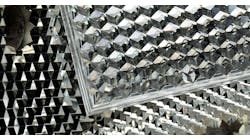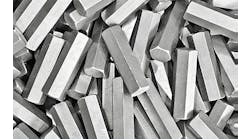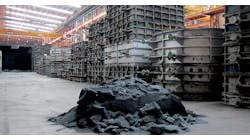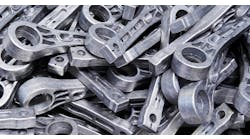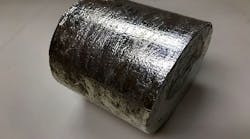IBC Advanced Alloys and NioCorp Developments Ltd. reported they have successfully cast several aluminum-scandium alloy ingots as part of their joint research effort, announced in 2016 to "investigate and develop applications for scandium-containing alloys for multiple downstream markets." The casting was conducted at the IBC Engineered Materials investment-casting foundry in Wilmington, MA, using scandium ore purchased commercially by NioCorp.
“This is a significant milestone in our joint development effort with NioCorp to seed the market in order to unlock the enormous value of scandium in a wide range of high-performance applications across multiple markets,” according to IBC president and CEO, Major General Duncan (“David”) Heinz (USMC, ret.)
NioCorp is a Colorado company now developing a site near Elk Creek, NE, to recover niobium, scandium, and titanium: the project is said to be the only one of its kind in North America. All are high-strength, low-density materials (described as “transition metals”) with significant industrial potential, for example in aviation, automotive, precision manufacturing, defense, and electronics, among others. Most of these are market that IBC addresses with its current subsidiaries, the beryllium-aluminum investment caster IBC Engineered Materials and IBC Copper Alloys.
Scandium (Sc, atomic number 21) is a chemical element present in most of the deposits of rare earth and uranium compounds, but it is extracted from those ores in very low volumes. NioCorp expects to produce as much as 97 metric tons/year of scandium alloy, and “to establish a secure and reliable supply chain …"
Alloys incorporating scandium have numerous applications in defense and civilian aerospace, to achieve high-strength and lightweight materials.
The ingots produced at IBC-EM represent an unspecified range of scandium content. They will be subjected to chemical analysis and other metallurgical tests to confirm the microstructure and performance of the alloys. The testing will be the basis for commercializing aluminum-scandium alloys, according to statement by IBC.
Mark A. Smith, IBC chairman and NioCorp exec. chairman and CEO stated: “Developing high-performance alloys and processes that incorporate metals such as scandium requires significant expertise and know-how. The board and I look forward to Chris’ (Huskamp) team continuing to advance this effort toward a potential launch of new commercial operations.”
Chris Huskamp is the former Boeing research executive who serves as president of the IBC Engineered Materials Division, and who leads the metallurgical team researching aluminum-scandium alloy production. He is listed as a co-inventor for two patents regarding scandium-bearing aluminum alloys.


